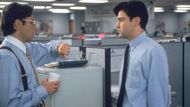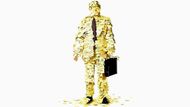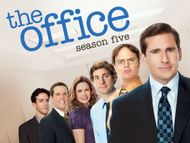Office Space is a 1998 comedy satire that eventually inspired many more movies and shows. The film deals with exactly what the title suggests: an office space inhabited by a group of workers in a software company. In 1999, we saw the world moving towards a gradual advancement of the world towards digitization, a culmination of which we see today. Software is thinking and doing jobs we once sweated over. This time period also saw mounting anxieties surrounding corporate expansions and a new kind of tech frenzy entering the scene.

Mike Judge's movie later went on to become a cult classic. The film did just okay at the box office, and it gained traction eventually. More and more people saw skyscrapers getting full with software companies, and as time passed, generations of techies resonated with the movie.
Even though there are differing opinions, it is almost apt to say that Office Space was one of the shows to popularize workplace comedy. This movie has been frequently referenced in many more that came after. Starting from The Office to internet memes still making rounds on social media. But beneath the dry wit, office humor, and awkward laughs, Office Space taps into the soul-crushing monotony of corporate work culture. Maybe, just maybe, the movie was not just a comedy, but something far more subversive? Something that tried to alert us to what was about to come?
Let us find out!
Disclaimer: This article contains the writer's opinions and spoilers. Reader's discretion advised.
Office Space defined and represented a whole generation of workers
The story of Office Space revolves around Peter Gibbons working day in and day out for a soul-deadening corporate (software) firm. Through Gibbons and other characters, the movie aims to capture the rising "cubicle culture" of 90's where employees were nothing more than walking and talking ID numbers.
While the movie satirizes the flip side of this work culture, it also adds a humorous touch to it. To bring out the humor, it relies on exaggerated archetypes like an overbearing boss or the obsessive stapler guy. This not only makes you laugh, but underneath the laughter, we all resonate and feel sympathy for these characters.

The slow disillusionment of the dot-com era
The dot-com boom era was initially treated by many as an era of promise. Tech spaces were seeing expansion, people were joining jobs that asked for little to no travel. On top of that, there was a glamor to the lifestyle. We recall many such office-going characters permeate into other narrative tellings: from sitcoms to romcoms. We see many of these characters in our own real life.
But the white-collar jobs were not all promise and prosperity. There was an element of despair: workers often found themselves going about the same routine over and over again. Gen Xers, who stepped into these workspaces hoping for a promising career and glamorous life ahead, often felt disillusioned as more time passed.
Office Space: a comedy or a warning
1. The slow decline of individual purpose
Even if you watch a movie with utmost concentration, it is often common to miss key details. Recall how in Office Space, the protagonist is often portrayed as apathetic. Peter Gibbons isn't just lazy—he appears to be exhausted from within. His lack of motivation is often read as a symptom of being emotionally dissociated from his work. Of course, in the contemporary corporate world where productivity is prized more than passion, it seems Office Space foreshadowed the future.
2. The gradual corporate dehumanization
If you have noticed carefully, you may have already taken note that the characters we saw in Office Space were rarely addressed by their names. Even the personal problems pertaining to their personal lives were treated as a reflection of operational failures. Moreover, we saw how company culture reduced these white collar jobholders to replaceable manpower. If you have not noticed this, then chances are you missed the warning signs lying deep within the surface-level comedy.
3. Rebellion as the only way out
Peter Gibbon's character rebelled, but only after the spirit of it was sparked by a hypnotherapy session gone haywire. This denotes enough on the satirical intent of the movie. He finds peace and some happiness only after disconnecting from the system entirely. This comic yet critical detail, isn’t a call to apathy, but a critique of workplaces which leave no room for a healthy mental outlet. The film doesn’t advocate bad behavior or slacking as the only coping mechanism available, but hints at the need for betterment.
4. Mental health goes for a toss (contains spoilers)
In one of the scenes from Office Space, Peter's neighbor Lawrence casually says, "You know, if you hang yourself in the garage, you won’t wake up in a cubicle on Monday."
It's a simple, easy-to-throw joke, but underneath this mundane remark lies the critique of how workers have normalized workplace despair. Similarly, if you recall the character of Tom Smykowski, you might also recall the scene when he had a full-blown breakdown after he feared being terminated.
5. Office Space created a space for more shows to follow

If we are speaking of warnings, let us take a detour to some good ones. Office Space wasn’t just a comic show: it was meaningful and relevant to its time.
Arguably, the tone and themes laid out by this show did the groundwork for other shows like NBC's The Office (2005) and Parks and Recreation (2009). Most importantly, it showed us that even in a serious setting with white collar employees wearing neatly ironed suits, donning serious demeanors, comedy can happen. What others picked were the deadpan delivery, character dynamics, and knack for finding humor in the glass-packed office cubicles of the 90's to the modern era.
Now, coming to the ultimate question: is Office Space just another office comedy or a warning? The answer is both. And if you missed the warning the first time, note these for the next time you rewatch it.
Also read: Why Eddie Munson from Stranger Things became the internet’s favourite doomed hero
Love movies? Try our Box Office Game and Movie Grid Game to test your film knowledge and have some fun!
